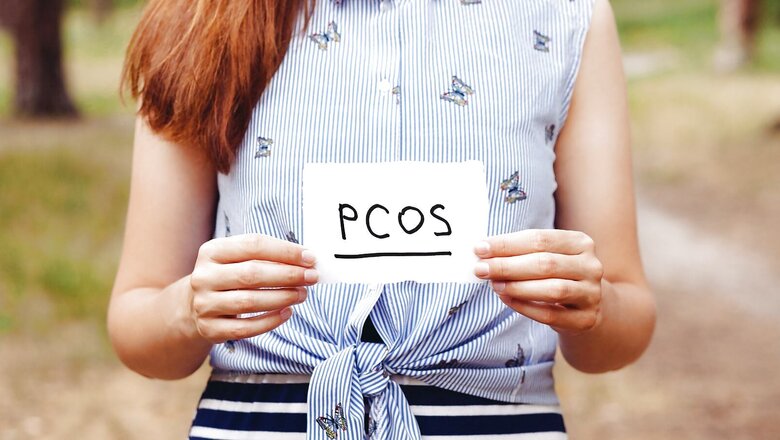
views
Many years have passed on but the struggles of millions of young girls and women due to PCOS refuse to break this silence. Like many, I have grown up with friends and worked with colleagues who have shared their stories of terrible pain, complexes and fear of societal judgments and stigma.
PCOS is an endocrine disorder predominantly affecting women of reproductive age. According to John Hopkins Medicines, it is a condition in which the ovaries produce an abnormal amount of androgens — male sex hormones — that are usually present in women in small amounts.
These hormones create havoc inside a woman’s body and the symptoms may vary. The classic symptoms include irregular or missed periods, excess facial and body hair, mild to severe acne and weight gain.
Earlier, PCOS was known as Polycystic Ovarian Disease (PCOD) instead of syndrome. However, over time, disease was changed to syndrome, considering that it’s a condition characterised by a group of symptoms and not an illness.
One of my friends Kaveri (name changed), who now works at a popular software firm, told me that she has struggled with ‘PCOS-induced self-esteem’ issues all her life. Now 37, she was diagnosed with PCOS when she was 16 years old.
“At an age when you want to look good, I struggled with a face full of painful acne and excessive hair. Forget about episodes of month-long bleeding, excessive weakness or acute hot flashes in the middle of client pitches, this condition gave me an abundance of inferiority complex and body issues,” she told me.
Kaveri not only deals with gynaecologists but a panel of doctors. “From endocrinologist and dermatologist to general physician, I keep bothering one or the other.”
Another college friend, who is a colleague now, is still struggling with the diagnosis. She works for a media house and by choice, decided to remain unmarried. Strangely, she has been advised numerous times to get married if she wants to cure PCOS.
“Pregnancy se theek ho jaata hai PCOS (Pregnancy cures PCOS),” she has been told repeatedly.
“No idea how prudent this is scientifically but for the last 15 years, I am dealing with something which still remains undiagnosed,” she told me over a WhatsApp message. In a lighter vein, she said: “I don’t want to get married or have babies with the objective of curing PCOS.”
My friend added: “I am still not sure about the exact medical condition my body is dealing with. Some doctors, just by looking at my face, tell me it is PCOS whereas other investigations hint otherwise.”
In fact, a study published by NCBI pointed out that women with PCOS must be screened for anxiety and depression, considering that they experience psychological distress due to multiple risk factors, including hormone fluctuations.
Multiple celebrities and social media influencers have started conversations over the issue but there is no movement towards betterment. Conversations begin and then fizzle out.
According to John Hopkins Medicine, many women with PCOS have insulin resistance, which means their bodies cannot use insulin well.
While there are no latest studies or estimates which put a spotlight on the incidence of the disease in India, a study conducted in 2018 by Metropolis Healthcare found that one in five Indian women suffer from PCOS.
I checked with Dr Rinku Sengupta, a senior gynaecologist who works at Delhi-based Rainbow Hospital, if the numbers hold relevance in today’s context.
“Estimates are fine,” she said after doing her math and added: “Over the last 10 years, the cases have gone up by at least 15 per cent in the OPD.”
Studies show that globally, the incidence is not as high as in India. One in every 10 women is diagnosed with PCOS across the world.
Despite the intensity of the issue in India, the government and medical fraternity are not working on streamlining the diagnosis and treatment criteria.
India’s apex healthcare agency, ICMR, has never released treatment or diagnostic guidelines for PCOS to bring consistency. The medical fraternity mostly follows international guidelines by the European Society of Human Reproduction and Embryology (ESHRE).
But this may not be totally valid for Indian body structures, considering the European guidelines are made based on their region, ethnicity and lifestyle. As PCOS is heavily influenced by lifestyle and body types, such variations can play a big role in diagnosis and treatment.
For instance: Studies suggest that European women hit menopause five years after Indian women while Indian girls get into the cycle of puberty earlier than European girls.
Joining the dots, it clearly reflects that our body type is different from theirs and we may need to coin our own guidelines.
The prescription of medicines is also impacted by the same. Clinical trials carried out in other countries won’t show real effectiveness on Indian bodies.
Till we decide to recognise PCOS as an urgency, mothers must do the needful.
While I don’t expect mothers of my mom’s generation to know about PCOS, those of our generation must take care of their daughters as they move into adolescence.
The half-a-dozen gynaecologists I spoke to before penning this column said despite the dearth of understanding behind the actual reason for developing PCOS, lifestyle is a word that comes up every now and then.
According to Dr Sabhyata Gupta, chairperson, gynaecology and gynae oncology at Medanta, Gurugram, “there has been an increase in cases of PCOS, with more young women detected with PCOS”.
All doctors I spoke to pointed out that the problem is caused by poor lifestyle choices, which include lack of physical activity, excessive intake of carbohydrates in the diet, stress, disrupted sleep patterns, and an unhealthy diet, including junk food and processes food items among other factors.
Also, obesity is noted to be a risk factor associated with an increase in cases but it does not mean that lean girls won’t be affected.
Mothers raising girls must take into account the given lifestyle factors and try to introduce a healthy diet and lifestyle since adolescence.
Also, PCOS may run in families and it is common for sisters or a mother and daughter to have it. In such cases, mothers can be the best judges. You can always work on the gamut of complexes and trauma this condition brings along.
For the rest, bursting the myth, there are no medicines which work for the treatment of PCOS.
Dr Sarika Gupta, senior consultant, Oncology and Robotic Gynaecology, Indraprastha Apollo Hospital, New Delhi, said: “Over 30 per cent of women or girls coming to me are diagnosed with PCOS.”
She added: “Mothers come to me with the hope that I will prescribe some medicine to treat their girls. Unfortunately, these medicines can temporarily improve the symptoms but ultimately they have to work on their lifestyle to get over the health conditions.”
Public awareness about PCOS is important because many women suffer from it but have been unaware for years. Women can help their ilk by increasing awareness of the symptoms and sharing their journeys and experiences.
The good news is that we know that PCOS can often be managed just by making informed lifestyle changes. Let’s work on it till we discover something more effective.
Read all the Latest India News here


















Comments
0 comment